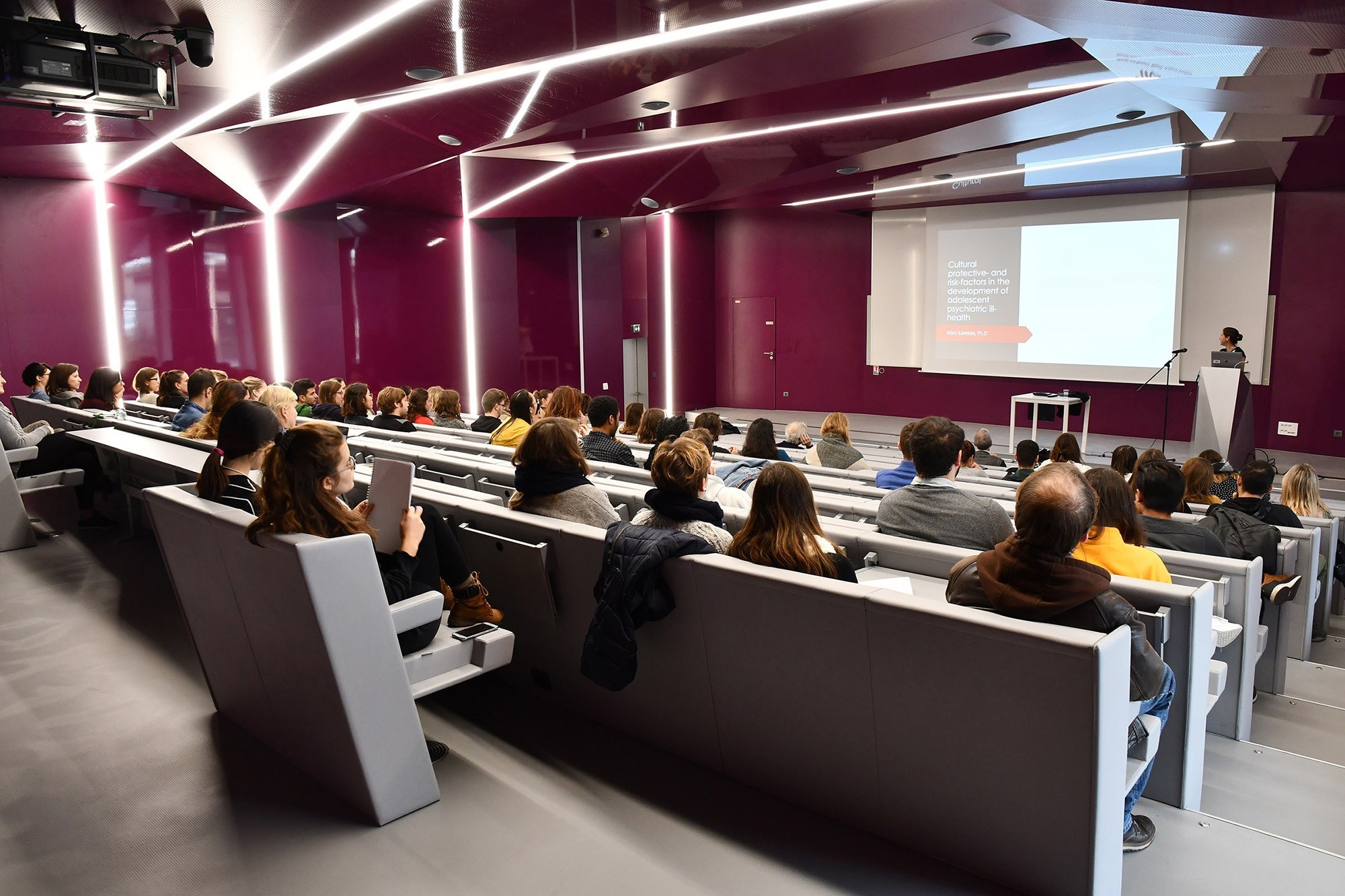
Next PhD seminars
Due to some unexpected changes, here is the schedule of the PhD seminars until July.
PhD seminars take place the Centre Broca. Theses monthly conferences are open to everyone, PhD students or not. They are co-organized by the NBA, Bordeaux Neurocampus and the Bordeaux Neurocampus Graduate Program. Funding: Bordeaux Neurocampus Graduate Program.
Please note that
 Stefanie Enriquez Geppert (Univ. Groningen – NL)
Stefanie Enriquez Geppert (Univ. Groningen – NL)
Wednesday 3 April / 11:30
Invited by Elise Grevet (Chanraud & Michelet’s team – Incia)
Title: Improving cognitions: Insights from a decade of Fmθ neurofeedback research
Abstract: Executive functions (EFs) are crucial cognitive abilities that control behaviour and adaptability and are essential for achieving goals and coping with daily life. Impairments in EFs significantly affect quality of life, highlighting the need for effective cognitive training approaches. Neurofeedback (NF) via a brain-computer interface (BCI) is a promising technique that specifically targets the neural basis of cognition. It relies on learning and neuroplasticity mechanisms and offers the potential for lasting cognitive improvements. This presentation will focus on frontal-midline theta (Fmθ)-NF, a protocol that relies on robust neuroscientific construct validity and is closely linked to EFs. The presentation will include: i) an update on advances in the field of NF, ii) neuroscientific findings on EFs, iii) a summary of current knowledge on Fmθ-NF research including a mega-analysis, and iv) new trends in Fmθ-NF such as the integration of psychedelics and tangible learning companions for the improvement of the protocol. The discussion will extend to the impact of NF on peak performance and clinical applications.
Wanna share some pizza with the Stefanie Enriquez Geppert ?
Register before Friday 29th: https://evento.renater.fr/survey/pizza-with-stefanie-enriquez-geppert-april-3rd-8ukua9jk
Carl Petersen (EPFL Lausanne, Switzerland)
(EPFL Lausanne, Switzerland)
Friday 3 May / 11:30
Invited by Théo Gauvrit (Frick’s team – Magendie)
Title: Neuronal circuits for context-dependent sensory processing
Abstract: Sensory information is actively processed in a context-dependent manner by complex neuronal circuits in the mammalian brain that remain poorly understood. Here, I will discuss context-dependent processing of a brief single whisker stimulus in thirsty head-restrained mice. In a Go-tone auditory context, mice receive a water reward for licking a spout after the whisker stimulus, but not in a NoGo-tone auditory context. We currently focus on a short-term memory context task where a brief auditory Go or NoGo tone is presented 1 s before the whisker stimulus and needs to be stored to correctly interpret the whisker stimulus. We quantitatively track orofacial movements of expert mice through high-speed videography, while measuring and manipulating cortical neurons involved in determining task rules, sensory processing, decision-making and motor control. Our analyses currently focus on addressing two key questions: a) How and where is the auditory contextual information stored during the delay period? We find that persistent activity in frontal cortex might play a prominent role. b) How and where is the whisker stimulus processed differentially according to the auditory context? We find that context-dependent processing can already be observed in the first responses in whisker sensory cortex, as well as all downstream cortical regions. These experiments begin to advance our understanding of the cortical mechanisms contributing to context-dependent sensory processing in the mammalian brain.
 Daniela Vallentin (Max Plack Institute, Starnberg, Germany)
Daniela Vallentin (Max Plack Institute, Starnberg, Germany)
Tuesday 11 June / 11:30
Invited by Eduarda Centeno (Leblois and Mallet’s team – IMN)
Title: Neural mechanisms of vocal learning and production in songbirds
Abstract: During conversations we rapidly switch between listening and speaking which often requires withholding or delaying our speech in order to hear others and avoid overlap. The ability of vocal turn-taking is exhibited by non-linguistic species as well, however the neural circuit mechanisms that enable us to regulate the precise timing of our vocalizations during interactions are largely unknown. We address this issue by studying zebra finches that coordinate their calls during vocal interactions. By performing intracellular recordings and pharmacological manipulation in the premotor nucleus HVC we found that inhibition regulates the coordination of social contact calls. To further study more complex vocal interactions we also study the singing behavior of nightingales. Male nightingales learn over 100 different songs which are used in order to attract mates or defend territories. We investigated auditory-induced vocal plasticity in interacting nightingales and discovered that nightingales rapidly and accurately imitated the pitch of pitch-controlled whistle playbacks. This finding highlights their capability of directly transforming an auditory input to a matching vocal response.
Songbirds learn their vocalization by listening to and imitating the song of their tutor during a critical period early in life. Once the bird reaches adulthood this song remains stable. We discovered that inhibition within the premotor area HVC plays a major role in closing this critical period by suppressing the influence of the tutor once song proficiency has been achieved. We then developed a cell-type specific viral strategy to target inhibitory neurons in adult zebra finches and were able to re-open the critical period by teaching an adult zebra finch novel song elements. This finding might have important implications to understand and expand motor skill learning capabilities or improve sensory and motor recovery after injury.
Agnès Nadjar (Cota’s team – Neurocentre Magendie)
(Cota’s team – Neurocentre Magendie)
Friday 5 July / 11:30
Title: The Neuroimmune Nexus: Bridging Nutrition and Brain
More details soon
Mise à jour: 26/03/24
